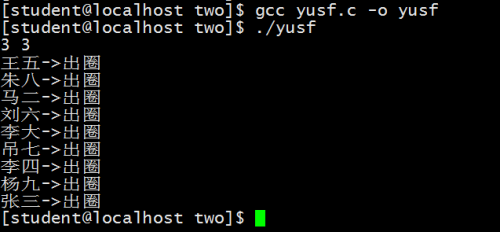1、隨機化數組問題
就是對已有的數組進行亂序排列,使之隨機的,毫無規律;
(1)、代碼實現
#include<stdio.h>
#include<time.h>
#include<stdlib.h>
void showArray(int *a, int count);
void random_1(int *a, int count);
void random_1(int *a, int count){
int i;
int tmp;
int index;
srand(time(NULL));
for(i = count; i > 0; i--){
index = rand()%i;
tmp = a[index];
a[index] = a[i-1];
a[i-1] = tmp;
}
}
void showArray(int *a, int count){
int i;
for(i = 0; i < count; i++){
printf("%d ", a[i]);
}
printf("\n");
}
int main(void){
int a[] = {4, 6, 8, 2, 0, 7, 1,};
int count = sizeof(a)/sizeof(int);
showArray(a, count);
random_1(a, count);
showArray(a, count);
return 0;
}(2)、結果截圖
2、約瑟夫環問題
M個元素,第N個元素出圈,從第start開始數即可;
(1)、代碼實現
#include<stdio.h>
#include<malloc.h>
void yusf(char **str, int count, int doom, int start){
int *person;
int i;
int pre = start-2;
int cur = start-1;
int alive = count;
int doomNumber = 0;
if(start == 1){
pre = count-1;
}
person = (int *)malloc(sizeof(int) * count);
for(i = 0; i < count; i++){
person[i] = (i+1)%count; //循環數組
}
for(; alive > 0; cur = person[cur]){
if(++doomNumber >= doom){
printf("%s->出圈\n", str[cur]);
alive--;
doomNumber = 0;
person[pre] = person[cur]; //出圈時的pre的保存
}else{
pre = cur;
}
}
}
int main(void){
char *str[] = {"李大", "馬二", "張三", "李四", "王五", "劉六", "吊七", "朱八", "楊九"};
int count = sizeof(str)/sizeof(char *);
int doom; //惡運數字
int start; //從第幾個人開始
scanf("%d%d", &doom, &start);
if(doom > count || doom <= 0 || start > count|| start <= 0){
return;
}
yusf(str, count, doom, start); //count個元素,doom個厄運數字,從第start開始;
return 0;
}(2)、結果截圖


